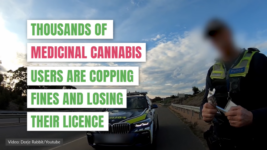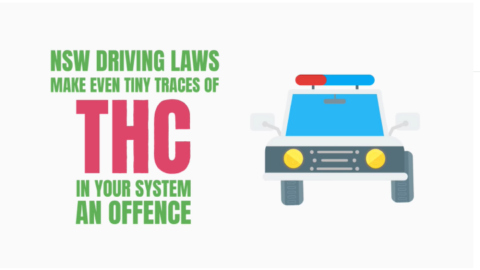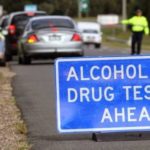NSW Parliament to Consider Medicinal Cannabis Defence to Drug Driving

“The current outdated roadside drug testing laws have very real impacts on the people of NSW, who should not have to choose between being in pain and losing their jobs,” said NSW Greens MLC Cate Faehrmann in relation to people who use cannabis medicine not being able to drive freely.
Legalised at the federal level in 2016, medicinal cannabis was once excruciatingly difficult to obtain, but these days, over 70,000 Australians are using these medicines via prescription, and yet, NSW police can currently pull them over, test them, impose a fine and suspend their licence.
This does not mean the patient is impaired when tested, as in NSW and most other Australian states, roadside drug testing only indicates whether there is any presence of a few select drugs in a driver’s salvia, so even tiny traces lead to a positive test result and subsequent punishment.
Introduced last November, Faehrmann’s Road Transport Amendment (Medicinal Cannabis – Exemptions from Offences) Bill 2021 provides patients who use medical cannabis with a defence for driving with traces of THC, the psychoactive component of the plant, in their system.
This straightforward and legitimate proposal has a groundswell of support in the community, as well as from medical and legal experts, and, as the NSW Greens drug law reform spokesperson explains, any opposition to the bill’s passing will likely be reflected in next year’s election result.
“It’s discrimination. Change the law”
“The current drug testing laws mean that people who have used medicinal cannabis for legitimate pain relief days ago could lose their licence and even cop a criminal conviction,” Faehrmann told Sydney Criminal Lawyers.
“The trace-based system of roadside drug testing is discriminatory to medicinal cannabis users, who are within their legal rights to treat their pain,” she continued. “This is an especially critical issue for those living in regional areas who need to drive as there is no public transport.
The Greens MLC outlines that over her time campaigning for the defence, she’s come across citizens and residents of “all ages and backgrounds”, who’ve related how “miraculous” cannabis medicine has been in treating ailments, especially when compared with other regularly used medications.
These people have been using it for all different types of pain and conditions, including cancer patients undergoing chemotherapy, PTSD, anxiety and depression, as well as in reducing debilitating seizures.
“However, anyone who needs to drive to work, pick up their kids from daycare or just live their lives without fear is forced to live in pain or risk losing their licence,” Faehrmann stressed.
The experts have spoken
On being introduced, the defence bill was sent to a committee for inquiry. And a long list of esteemed supporters spoke in favour it, including the Lambert Initiative’s Professor Iain McGregor, United in Compassion’s Lucy Haslam, the Australian Lawyers Alliance’s Greg Barns, former NSW DPP Nicholas Cowdery and the Medicinal Cannabis Users Association’s Deb Lynch.
However, the report of the Coalition top-heavy law and justice committee inquiry made one recommendation: that the bill be returned to parliament for debate.
“While most MPs recognise that it’s not an ideal situation that many medicinal cannabis patients who aren’t impaired can’t drive, they’re reluctant to reform the law by providing a medical defence at this stage,” Faehrmann explained in relation to the sit-on-the-fence recommendation.
“Their key concern, apparently, is that there’s no way to test for impairment for THC and therefore, any change in the law will result in people getting behind the wheel while stoned,” she said, adding “of course, this is not the intent of the bill”.
Just like any other prescribed medicine that can cause impairment, such as benzodiazepines, or with recreational alcohol use, individuals shouldn’t be driving whilst intoxicated and, as the Greens MLC underscored, neither should medicinal cannabis users who are following their GP’s instructions.
Opioid driving: no problem
“From the discussions I’ve had with MPs from the government, they’re going to want to see more evidence that THC impairment can be tested to get them over the line,” Faehrmann continued. “This is frustrating and a cop out.”
It’s also quite a long ask considering that the NSW police roadside drug testing regime cannot detect whether a driver is impaired by any of the four drugs tested for – cannabis, amphetamines, MDMA and cocaine – as the devices used only identify traces, not levels, of these substances.
So, under the current system, a driver under the influence of synthetic-opioid oxycodone or the illicit substance heroin can be pulled over by police, made to provide a saliva sample, and then, on returning a negative result, be sent on their way, even if they’re “pinned to the eyeballs”.
Indeed, subsection 111(3) of Road Transport Act 2013 (NSW) stipulates that a person cannot drive with the presence of morphine in their blood or urine, although police officers don’t test for this on the roadside.
And subsection 111(5) of the Act goes on to provide a defence for driving with morphine in a person’s system if “the presence in the defendant’s blood or urine… was caused by the consumption of a substance for medicinal purposes”.
The want of the people
“This bill would allow medicinal cannabis users to live their lives and drive on our roads when it’s safe to do so, without fear, just like anyone else who uses prescription drugs according to their doctor’s advice,” Faehrmann made clear.
The Greens member further suggested that it’s the heavy stigma surrounding cannabis that’s preventing conservative politicians from taking the just approach to this matter, despite “medicinal cannabis use booming” and public opinion changing rapidly.
And not all states are continuing to punish people for committing what essentially is not a crime. Tasmania police confirmed in July last year that while driving with THC in a person’s system remains illegal, if the substance has been obtained via prescription its lawful.
Faehrmann added that she’s heard from numerous people in the community whose lives have been improved by cannabis medicine, and yet they continue to have to make the choice between driving or taking it.
The medicinal cannabis driving defence bill is to go up for debate in the NSW Legislative Council on 12 October.
“With this much public support the law will change,” the Greens MLC said in conclusion. “All parties should make it clear where they stand on this issue before the election because I have no doubt that there will be quite a few people who cast their vote on this issue alone in NSW.”
Going to court for a traffic offence?
If you are going to court for a traffic offence, call or email Sydney Criminal Lawyers anytime to arrange a free first consultation with an experienced, specialist traffic lawyer who will accurately advise you of your options, the best way forward, and fight for the optimal outcome in your specific situation.









